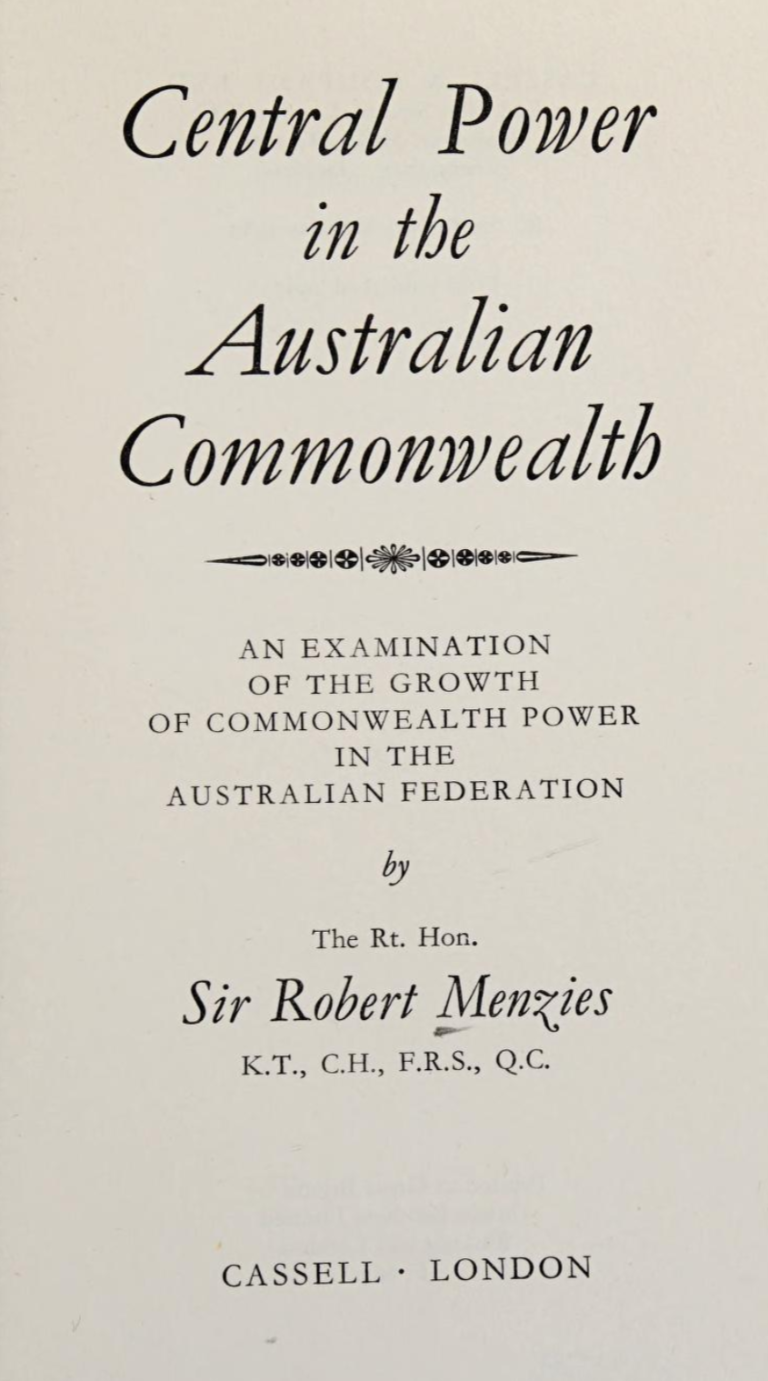Sir Robert Menzies, Central Power in the Australian Commonwealth: An Examination of the Growth of Commonwealth Power in the Australian Federation (1967)
What should an ex-prime minister do with their newly-found free time?
Since Robert Menzies had the unusual privilege of retiring of his own volition, he had no need to engage in the common post-prime ministerial past time of taking shots at his former colleagues. Instead, he decided to put the unique insights he had garnered over his long career to good use, via a study of the evolution of the Australian constitution. This was a subject on which he was an undoubted expert, and not just because he had spent 18 years in the top job. Menzies had been engaging in debates surrounding constitutional amendments since the 1920s (he first became involved in politics to campaign for ‘No’ in the 1926 referendum) and he even won a landmark constitutional decision, the Engineers’ Case, appearing before the High Court when he was just 25.
However, Menzies was not content simply to tell Australians about how their own constitution functioned. With an inquisitive mind that had not yet dimmed at the age of 72, he instead decided to teach the Americans about our constitution, thereby revealing how it both mirrored and differed from that of their own federal system.
In 1963 Menzies had been given the honour of delivering the Jefferson Oration at Thomas Jefferson’s stately home of Monticello in Virginia, and while there he had also visited the University of Virginia which Jefferson had helped to found. He instantly became enamoured with the place, and half-jokingly promised its President Edgar Shannon to come back and guest lecture when he had the time. As of 26 January 1966 Menzies did have the time, and within 48 hours of his retirement announcement Shannon wired Menzies with a fresh offer to take up a position as scholar in residence.
Starting on 10 October that same year, he delivered a series of 7 lectures, which were published the following year as Central Power in the Australian Commonwealth. As outlined in the introduction, the book aimed to explain how power had increasingly become centralised in the hands of the federal government, even though the Australian people had repeatedly and explicitly voted against this when it came to constitutional referenda:
‘Those who were, like me, brought up on the fundamental constitutional studies of A. V. Dicey and Lord Bryce will remember in particular the latter’s exposition of the two forces which operate in a federation; the centripetal and the centrifugal. Expanding this, I believe that all modern experience has shown that in a federation, where powers are distributed between the National Government and State or provincial governments, there will develop either a movement, conscious of unconscious, to increase powers at the centre, or an opposite movement to increase the State or provincial powers at the expense of the central authority. In short, though the process may be a long one, federations tend either to become more dominated by the centre, with perhaps a perceptible public sentiment in favour of complete union, or to break up into their fractions… The former process is clearly visible in the United States and Australia, though in neither case is there any majority disposition to abandon federation for a closer form of organic union…
Broadly, what I set out to do in the lectures now embodied in this book, is to demonstrate how it has come about, in Australia, that the powers of the Central Government, though defined and therefore in form limited by a written Constitution, have tended to grow far beyond the conception of the original draftsmen; to some extent, it is true, as a result of formal amendment of the language of the Constitution itself, but to a material extent as a result of new and extended judicial interpretation of existing powers, with a marked tendency to aggregate financial power (and therefore political power) in the hands of the Parliament and Government of the nation.’
Despite noting that he was a life-long federalist, ‘particularly for a large continent with widely scattered communities, with great regional or local problems and understandable local prides and patriotisms’, Menzies showed little lament towards this process, and tried to treat what he observed with a certain degree of emotional detachment. Although presciently, he did warn that the exact same scenario was sure to play out should Britain join the European Common Market. He was likewise openly critical of the external affairs power being used to expand the Commonwealth’s remit into areas for which it had signed treaties, and for good measure he threw in a supplementary note justifying why Australia had no Bill of Rights – a question raised by one puzzled American student during the lectures.
You might also like...
Sign up to our newsletter
Sign up for our monthly newsletter to hear the latest news and receive information about upcoming events.



